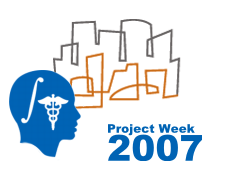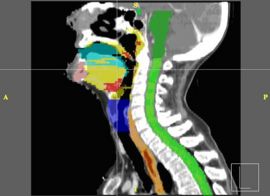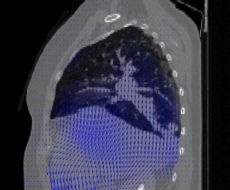Collaboration/MGH/Radiation Therapy Radiation Therapy Planning
 Return to Project Week Main Page |
Key Investigators
- MGH: Greg Sharp, Ziji Wu, others (TBD)
- BWH: Tina Kapur, Sandy Wells, Steve Pieper, Katie Hayes (TBD)
Objective
Explore collaboration in areas of mutual interest: segmentation, registration, and interactive tools.
Interactive Segmentation
Modern radiotherapy requires manual contouring of both target structures and healthy normal tissues, to ensure adequate coverage with minimal radiation side effects. The goal of this project is to evaluate if 3d-slicer is capable of providing a comfortable user interface needed for physicians and physicists to perform manual contouring.
Deformable Registration
Accurate assessment of radiation dose to the thorax and abdomen during respiration requires simulation of a static beam that irradiates a moving and deforming target. The goal of this project is to use deformable registration for radiation dose calculations in these sites.
Approach, Plan
Interactive Segmentation
We currently use commercial tools for segmentation. The approach will be to import the best ideas from existing systems, but also include tools which are missing such as tilted-plane drawing tools and intelligent contour interpolation.
Deformable Registration
We currently use standard deformable registration tools (B-splines, RBF, optical flow), but they are not as reliable as they could be. There are many approaches to improve: especially using interactive tools for validation and using segmented regions for guidance.
Progress
Identified two projects of possible collaborative interest. These will be followed up over the next 2 months.
Interactive segmentation
This is a good fit with interactive ROI project organized by Wendy. Wendy and I discussed usability issues related to minimizing the number of menu bar accesses, and minimizing toolbar mouse clicks. Discussed advanced features, such as semi-automatic contouring. May need to schedule follow-up visit for Wendy to see our setup.
2D-3D Registration
Patient positioning is performed by matching a 2D image with a 3D scan. This process can be automated with 2D-3D registration. Sub-areas of potential interest are (1) Portal imaging, (2) orthogonal rigid matching vs. 3-D cone-beam deformable matching.
Additional Information
- See pdf file for overview: Media:Sharp-radonc-v1.pdf
- Greg gave Wendy and Steve a demonstration of the planning tools in use at MGH (August 2007). Some tools that are particularly helpful and might be added to slicer's editor include:
- A "Remove Bridges" tool to separate touching regions
- A combination tool: Connected Region Grow, Remove Bridges, Remove Islands (as a single click)
- Interpolate Contours (various ways to do this)
- Erase All for a given label in volume or current slice
- Display label map as outline (show multiple labelmaps on current slice)
- Integrate masking into all operations
- Edit label boundaries as polylines (go back and forth between label and boundary representation)

